- Home
- Kieran Larwood
The Gift of Dark Hollow Page 14
The Gift of Dark Hollow Read online
Page 14
The Gorm Lord made a kind of shrieking groan as Podkin stepped closer. His red eyes stared down with utter hatred at the small rabbit, but he didn’t seem able to speak. Perhaps the brambles had wormed their way inside his mask, pushing past his lips and down into his throat. Podkin hoped so. He hoped it hurt like hell too.
‘Ngggh! Nooo!’ Scramashank growled.
Podkin tapped at the Gorm’s outstretched hand with Starclaw. It trembled as Scramashank tried to pull it away.
I can’t cut through the iron, Podkin thought. But there might be a gap or a joint somewhere. I could squeeze Starclaw in there.
He had cut off Scramashank’s foot before, but that had been in blind panic, and over in a split second. Could he really saw through another rabbit’s arm in cold blood? He didn’t think so. But then again, he couldn’t leave the hammer either.
Podkin looked at it again, clutched in Scramashank’s hand. The head was beautifully cast bronze, sparking and glinting in response to Starclaw being near it. He dare not cut that either. What if it stopped Surestrike from working? But the shaft – that was just wood. Could he slice through that? Would the Goddess mind too much?
He decided she would mind more if the Gorm took the hammer. With a quick flick of his blade he snipped Surestrike’s head free, and it fell into his hand.
‘Nnnaarrgghhhh!’ Scramashank screamed, his whole body trembling in fury. Podkin flinched, but then realised something. He wasn’t terrified any more. His feet had stopped telling him to turn and run. Instead, he was filled with a kind of calm pride. Podkin held up Surestrike’s head to where Scramashank could see it. He moved it so it twinkled in the moonlight.
‘See this?’ he said. ‘It is mine now. I have beaten you once, and now I’ve done it again. I am not a “little runt”. I am Podkin One-Ear. I am Podkin Moonstrider. I am Podkin the Gift-Bearer. And I’m not afraid of you any more. In fact, it is you who should be afraid of me.’
Scramashank roared at this, so loudly he began to choke. Podkin waited for him to finish.
‘I am taking my friends and going now. And I’m going to cut the bridge down behind me. You can stay on this island and rot.’
And with that he went to help Paz and the others carry Crom and Zarza over to the bridge, and off Ancients’ Island forever.
INTERLUDE
At some point during the story (and when the two other bards had dwindled to specks on the road ahead) the bard and Rue had packed up their lunch things, slung their packs over their shoulders and continued their walk along the backbone of the downs. All the time the bard was telling his tale, and all the time Rue was staring up at him, tripping and stumbling over lumps of flint and potholes on the path, but not wanting to miss a word.
As they reached the climax – the battle outside the tomb – the bard sat himself down on a tussock of dry grass, with Rue crouching at his feet. They were up above the rest of the world, on a crest of the downs with forests and fields spread out before them, and an endless blue sky overhead, but for Rue nothing else existed except the bard’s sharp green eyes, and the pictures of Podkin and his friends inside his own head.
Now the bard finishes and takes a deep breath, stretching his back and warming his ears in the sunshine. There is a pause of a few seconds while Rue digests what he has heard, and then the questions begin again.
‘Was that the end? Did they get the hammer home? What about Crom and Zarza? Did they survive? What happened next? That can’t be the end!’
‘Relax, relax,’ says the bard. ‘Keep your ears on. There’s more to come, but plenty of time to tell it later.’
‘Later? Why later?’
The bard points east with his staff, along the ridge of the downs. The narrow chalk path they have been following spiders along the hills’ spine, and then drops down into a valley. On the other side, where the downs begin again, a ring of standing stones is silhouetted.
‘See there?’ says the bard. ‘That’s the Blackhenge. Down in the valley is the festival. We’ve arrived.’
Rue strains his ears and there, blown on the wind, is the jumbled sound of hundreds of voices, instruments and songs, drifting up from somewhere just out of sight. All thoughts about the story vanish for a moment and he jumps to his feet.
‘You mean we’re here? What are we sat around waiting for then? Let’s go! Let’s go!’
Rue pulls the bard to his feet and together they hurry along the path as fast as the old storyteller’s aching back will let him.
*
When they are close enough to the Blackhenge to see the sun glinting on the glassy obsidian megaliths, they peer down the steep bank before them and into the valley.
Rue gasps, and the bard laughs to see his little eyes almost pop out of their sockets. He remembers the first time he saw the festival, standing beside Yarrow on this very spot and listening to his new master laugh at him. Does everything move in circles? he wonders to himself. Does everything repeat like this, over and over throughout all time? Standing in the spring sunshine, looking down on the merry scene below, that doesn’t seem like such a bad thing.
There is a wide valley down there, peppered with windblown trees and straggly hawthorns, and filled from one end to the other with an explosion of noise and colour.
Flags, tents, stages, banners – it is like someone has taken a huge box of rainbow-dyed material and thrown it up into the air, letting it land in a roly-poly, higgledy-piggledy mess of glorious colour.
A whole town has been whipped together out of canvas and wood. An above ground town, as well. It is beyond anything Rue has ever imagined, and he is still staring at it, his mouth slowly opening and closing in amazement.
‘See there?’ says the bard. ‘That’s the High Bard’s stage where the contest happens. It’s in the centre, so the rest of the festival is built around it.’ Rue spots a hexagonal wooden structure, ringed with tiers of benches and topped with streamers, banners and flags that wave in the spring breeze.
‘Then you’ve got the smaller stages,’ continues the bard, ‘for different performances all through the day. Minstrels, dancers, singers, poets, acting troupes, mimes. Most years I just end up under a bench in the mead tent.’
‘What … what’s all that?’ Rue finds his voice and points to a patchwork collection of fabric mounds that run up the opposite hill, almost to the top.
‘The campsite,’ says the bard. ‘Lots of burrows made of cloth, sitting on top of the ground. You can rent one to stay in for the festival, if you want. If sleeping under a mead tent bench isn’t good enough for you.’
‘And there? And there?’ Rue points to other parts of the canvas town, all crawling with rabbits, singing, shouting and chattering.
‘That there is the market, and there are the food stalls. Over yonder is a circus and there is the tattoo village. That’s where bards get their ears inked.’
‘Can I get a tattoo? Can I?’
‘No you flipping well can’t,’ says the bard. ‘What would your mother say?’
‘Come on then,’ says Rue, hopping up and down on the spot. ‘Let’s get down there! Quick! Quick!’
‘Hern’s antlers,’ curses the bard. ‘There’s no rush. It’s not going anywhere.’
They begin the scramble down the hillside, Rue running ahead, then hopping back to help the bard over roots and patches of crumbling chalk. As they near the entrance – a huge gateway, flanked by two carved tree trunks in the shape of Clarion himself – the bard stops and pulls his hood low over his head again.
‘Why are you doing that?’ Rue stops to ask. ‘Are you hiding again?’
‘Never you mind,’ says the bard. ‘I’m just cold, that’s all. Come on, in we go.’
They join the crowd of rabbits milling about the entrance. Rue is elated to see they are all bards as well. Tattooed and pierced ears, dyed and shaved fur. Some with spirals and swirls, others with zigzags, squares or diamonds. Bards from every corner of the Five Realms, with every kind of instrument imaginable slung
on their backs or wrapped carefully in pouches, bags and cases. Rue spots harps, pipes, flutes, lyres and bodhrans and many other things he has no names for. Strangely shaped tubes and trumpets, leather bags with pipes sticking out, things with cranks and handles and keys all over. Do all these make music? Why has he never seen them before? He suddenly feels as though he is very small and doesn’t know very much about the world.
The bard squeezes his paw, knowing exactly what he is going through. ‘Keep tight hold of me,’ he says. ‘Don’t get lost.’
They spend the day wandering through the maze of tents, stopping here and there for Rue to marvel at something else new and wonderful.
They see jugglers and firebreathers, singers and acrobats. There are puppeteers and musicians, actors and storytellers. Here and there they pause at a little stage to hear a snatch of song or catch the end of a story, but there is always more to see, and Rue is always tugging at the bard’s hand to move on. All the while, the bard keeps his hood pulled low, staring at the ground and avoiding eye contact with everyone.
Rue notices, but is too excited to mention it.
At some point in the afternoon, they stop for lunch. The bard takes them over to a food stall and empties a pouch out into his paw. Currencies from countries far and wide. Rue spots coins of different sizes and metals, bone counters, clay cubes and one or two sparkling gems. The bard rifles through them with his fingers, pulls out a silver piece with a rabbit’s head on one side and buys them both a pastry filled with chunks of sweet potato, fried onions and herbs. It is the most delicious thing Rue has ever tasted.
‘Pasties from western Enderby,’ says the bard through a mouthful of crumbs. ‘There’s food from all over the Five Realms here. But you have to be careful what you’re choosing. Some rabbits eat stuff that’ll singe the fluff off your tail when it’s on its way out. These should be safe, though.’
‘Aren’t you hot now?’ Rue asks, when his pasty is finished. ‘Don’t you want to take your hood off?’
‘Come on,’ says the bard, dodging the question. ‘There’s more to see before the contest.’
‘A contest? What contest?’ And then they are off into the crowds again, this time looking at the stalls of carved instruments on sale, and the brave rabbits having fresh patterns tattooed into their ears with ink and needle.
By early evening, Rue is starting to flag. He has seen so many new things, his little head is spinning. The bard rents a tent for them, they drop off their bags and then head for the High Bard’s stage, finding seats at the very top of one of the wooden tiers. Rue snuggles into the bard’s side, clutching the little wooden flute the bard bought for him like it is the most precious thing in the world.
‘The contest will be starting soon,’ says the bard. ‘Only the best from the whole Five Realms get to perform. The winner will be chosen as the High Bard’s champion and win the cup.’
‘Like you did?’ Rue says, yawning. ‘Seven times?’ ‘Hush about that,’ says the bard. He peers at the rabbits filling the benches around him, hoping no one heard.
‘We didn’t find me a master,’ says Rue. ‘I thought that was why we came.’
‘Time for that tomorrow,’ says the bard. Torches are being lit around the stage, the sky above is turning from blue to purple. ‘Let’s not think about that now.’ He puts an arm round little Rue, as if he doesn’t want to let him go, and looks down at the stage with sad green eyes.
The seats are full now, and from somewhere behind the curtains, a fanfare sounds. Four strong bard rabbits walk out on to the hexagonal stage, bearing a throne-like chair on their shoulders. On it sits an ancient figure, his grey fur faded almost all over into white. He has tired, heavy-lidded eyes and shaking hands. There are freshly dyed spirals covering his arms, loud against the pale fur. His long drooping ears are marked with faded tattoos and weighed down with huge silver discs, sparkling in the light from the torches, as does the silver ring through his nose. He nods and waves at the cheering audience.
‘Is that the High Bard?’ Rue asks. The bard nods. ‘He has discs in his ears, just like Yarrow from your story.’
‘Hmm,’ agrees the bard. ‘So he does.’ The throne-bearers place the High Bard at the back of the stage on a dais especially constructed for him. He says something in a weak, shaky voice, that is too quiet for Rue and the bard to hear, sitting all the way at the back and surrounded by rabbits talking and munching on cooked corn kernels.
‘What’s he saying?’ Rue asks. ‘I can’t hear over all the munching!’
‘He’s announcing the contest,’ says the bard, a faraway look in his eyes. ‘He’s reading the list of competitors.’
It doesn’t matter that they don’t hear the names. It doesn’t matter that the rabbits in front insist on talking at the top of their voices and chewing corn as loudly as they possibly can. Soon Rue is lost in the performances of the competitors.
First there is a poet from Orestad, who recites a ballad about the sea. He is followed by a musician from the fens of Hulstland: a funny little rabbit with long legs, stubby ears and huge feet who plays a set of pipes made from marsh reeds.
Next up is a giant rabbit from the Thriantan coast. He sings a song in his booming language of hoots and bellows. Strange, magical music that reminds Rue of deep burrows and the wind blowing through hollow trees. No rabbit around them appears to understand the words, but they all applaud furiously when he finishes.
He is followed by a rabbit Rue recognises: the female bard they met on the downs. She tells a tale of the world when it was owned by Gormalech, the metal god of the Gorm. It is a sad, tragic story of a dead and empty place – everything on it consumed by greed – but it ends with a glimmer of hope: the Goddess, Estra, and her sister Nixha drifting through space, about to find the world and challenge Gormalech for its ownership.
Finally: the star turn, a bard from the exotic tribes of the Ice Wastes. His mane of white fur is spiked up on his head, his beard braided with bones and wooden beads, and he is dressed in wolfskins and painted leather. He starts on a rhythmic, lilting chant, accompanying himself with beats from a skin drum, but the bard notices Rue has fallen fast asleep.
The bard isn’t bothered too much about hearing the Ice Waste song. Not when he has already spent two years amongst the tribes there in the past. He’s also not bothered about hearing the High Bard choose his champion. Not when he remembers standing on that stage himself, waiting for the glory and applause. A part of him still misses it, he realises – misses it badly – but to think of it now would be silly. He shouldn’t even be at the festival at all, not with the danger he is in.
He scoops Rue up and makes his way back to the tent, squeezing through the crowds, grateful that it is now dark and no rabbit can see his face.
*
The bard is just tucking Rue up in his cloak when the little rabbit stirs from his sleep. He blinks his eyes and looks around the inside of their rented tent, lit by a hanging oil lamp.
‘You fell asleep,’ says the bard. ‘I brought you back to the tent.’
‘I missed the contest!’ Rue looks heartbroken. ‘Who won in the end?’
‘Who knows?’ The bard shrugs. ‘We’ll find out tomorrow, I expect. Not that it really matters. It’s the songs and stories that are important, not some silly cup.’
‘I hope it was the lady bard,’ says Rue. ‘Then I can say I’ve met the High Bard’s champion.’
The bard is about to make some comment about personally winning the cup seven turnipping times, but remembers that he is supposed to be keeping that a secret.
‘I can still hear music and laughing,’ says Rue. ‘Can we go back to the festival?’
‘Not now,’ says the bard. ‘Now it’s bedtime. I don’t know about you, but my legs are killing me.’
‘But I’m missing things …’ Rue protests.
‘They’ll all be there tomorrow,’ says the bard. ‘There’s another two days of the festival left. By the end you’ll be sick of the place, t
rust me.’
‘I’ll never be sick of it,’ says Rue, with the complete confidence of the very young. He looks up at the bard, who has finally pulled back his hood and is rubbing his tired, dusty eyes. ‘Can you at least finish the story of Podkin? I want to know if he got the hammer back home. And what happened to Crom and Zarza. Did they die? Did anybody die?’
‘What’s all the obsession with dying?’ says the bard. He doesn’t really feel like more storytelling, but if it will get the little rabbit to sleep …
‘Very well,’ he says. ‘Snuggle down and close your eyes, and I’ll finish the tale.’
CHAPTER THIRTEEN
Home
Podkin and his friends reached the bridge and somehow managed to cross it, slipping and sliding all the way. On the other side, Podkin put his paw into the rock, but the handle was still hidden. Instead, he took Starclaw and began slicing the cairn to pieces.
Even though the stone was solid granite, the magic dagger chopped it up as if it were raw potato. In a few seconds, Podkin had the mechanism of the bridge exposed: metal wheels studded with teeth that locked together and turned each other. It was a beautiful, complex construction from a forgotten technology that ought to be studied and learnt from.
Podkin hacked it to bits, feeling terrible as he did so.
He was rewarded by a grinding, clunking sound, as the stones of the bridge slid back underwater to be forever hidden by the lake mud. The Gorm were trapped on the island.
‘Well done, Podkin,’ said Mash.
‘We have to run now,’ said Podkin. ‘Scramashank is trapped, but there could be more Gorm on the way. If we can make it back to the woods again, we can hide there until tomorrow night.’
As silently as they could, and dragging Crom and Zarza between them, they staggered to the safety of the trees, arriving just as dawn lit the sky. While Mash and Yarrow built them a shelter, Paz and Podkin tended to the wounded.

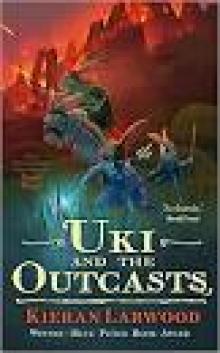 Uki and the Outcasts
Uki and the Outcasts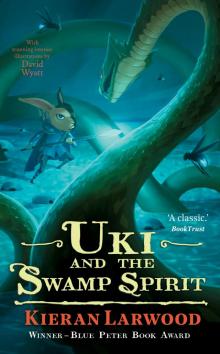 Uki and the Swamp Spirit
Uki and the Swamp Spirit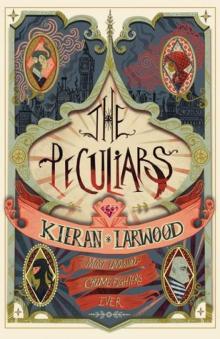 The Peculiars
The Peculiars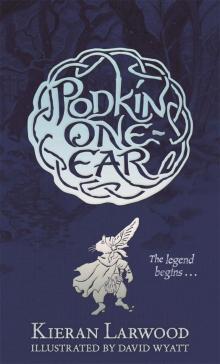 Podkin One-Ear
Podkin One-Ear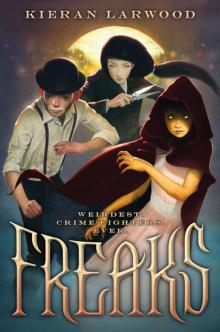 Freaks
Freaks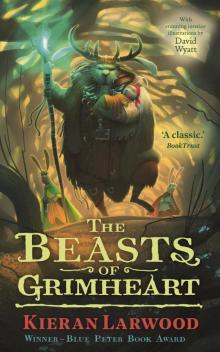 The Beasts of Grimheart
The Beasts of Grimheart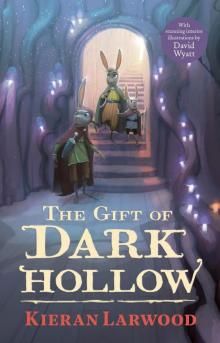 The Gift of Dark Hollow
The Gift of Dark Hollow